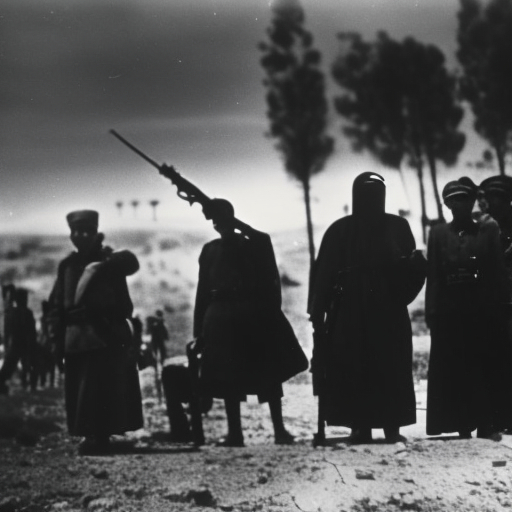Summary: 1947–1948 Civil War in Mandatory Palestine
The 1947–1948 civil war in Mandatory Palestine was a conflict that took place between Jewish and Arab communities in the region. It was a result of the United Nations’ decision to partition Palestine into separate Jewish and Arab states. The civil war marked a significant turning point in the history of the Israeli-Palestinian conflict and ultimately led to the establishment of the State of Israel.
Background
The conflict in Mandatory Palestine had been escalating for years, with tensions between Jewish and Arab communities growing. The British, who had been administering the territory since the end of World War I, struggled to maintain control and prevent violence between the two groups. In 1947, the United Nations proposed a partition plan that would divide Palestine into separate Jewish and Arab states, with Jerusalem under international administration. While the Jewish community accepted the plan, the Arab states and Palestinian Arab leaders rejected it, arguing that it violated the rights of the Arab population.
Outbreak of Violence
Following the United Nations’ decision, violence erupted throughout Palestine. Both Jewish and Arab militias engaged in attacks and counterattacks, targeting each other’s communities. The conflict quickly escalated into a full-scale civil war, with both sides committing acts of violence and atrocities against civilians. The British, overwhelmed by the situation, announced their intention to withdraw from Palestine by May 1948.
Key Events
- November 29, 1947: The United Nations General Assembly approves the partition plan, leading to widespread protests and violence.
- December 1947: Arab forces launch attacks on Jewish communities, leading to retaliatory actions by Jewish militias.
- April 1948: Jewish forces launch Operation Nachshon, aiming to secure the road to Jerusalem. This operation is followed by other military campaigns, including Operation Yiftach and Operation Harel.
- May 14, 1948: The British Mandate officially ends, and the State of Israel is declared.
- May 15, 1948: Arab states, including Egypt, Jordan, Syria, and Iraq, invade Palestine in response to the establishment of Israel.
Consequences
The civil war had far-reaching consequences for both Jewish and Arab communities in Palestine. It resulted in the displacement of hundreds of thousands of Palestinians, who became refugees in neighboring Arab countries. Many Jewish communities also faced attacks and had to defend themselves. The conflict led to a significant demographic shift, with Jewish forces gaining control over territories that were designated for the Arab state under the United Nations partition plan.
The civil war also had political implications. The establishment of the State of Israel in May 1948 marked a turning point in the Zionist movement’s quest for a Jewish homeland. The conflict also led to the Arab states’ rejection of the partition plan and their refusal to recognize the State of Israel, setting the stage for future conflicts and tensions in the region.
In conclusion, the 1947–1948 civil war in Mandatory Palestine was a violent and bloody conflict between Jewish and Arab communities. It was a direct result of the United Nations’ decision to partition Palestine, leading to the establishment of the State of Israel. The civil war had significant consequences, including the displacement of Palestinians and the rejection of the partition plan by Arab states. It marked a crucial turning point in the Israeli-Palestinian conflict and set the stage for future conflicts in the region.












